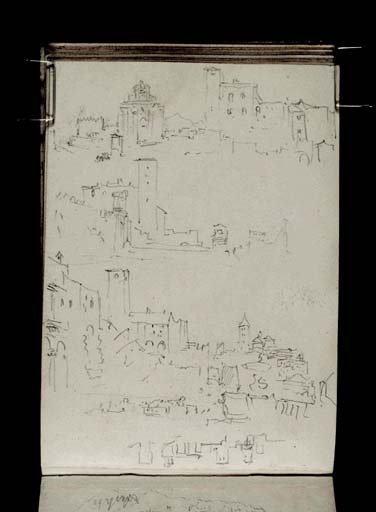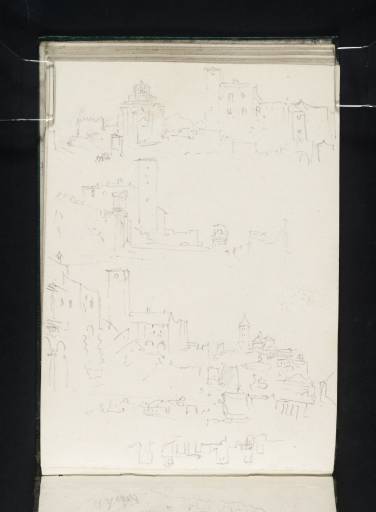Joseph Mallord William Turner Viterbo: (a) (b) Porta Fiorentina and the Rocca from outside the Walls; (c) Gardens of the Palazzo Comunale, with Two Etruscan Tombs and a Fountain, Looking towards the Campanile of the Cathedral; (d) Panorama c.1828-9
Image 1 of 2
-
 Joseph Mallord William Turner, Viterbo: (a) (b) Porta Fiorentina and the Rocca from outside the Walls; (c) Gardens of the Palazzo Comunale, with Two Etruscan Tombs and a Fountain, Looking towards the Campanile of the Cathedral; (d) Panorama c.1828-9
Joseph Mallord William Turner, Viterbo: (a) (b) Porta Fiorentina and the Rocca from outside the Walls; (c) Gardens of the Palazzo Comunale, with Two Etruscan Tombs and a Fountain, Looking towards the Campanile of the Cathedral; (d) Panorama c.1828-9 -
 Joseph Mallord William Turner, Viterbo: (a) (b) Porta Fiorentina and the Rocca from outside the Walls; (c) Gardens of the Palazzo Comunale, with Two Etruscan Tombs and a Fountain, Looking towards the Campanile of the Cathedral; (d) Panorama c.1828-9 (Enhanced image)Enhanced image
Joseph Mallord William Turner, Viterbo: (a) (b) Porta Fiorentina and the Rocca from outside the Walls; (c) Gardens of the Palazzo Comunale, with Two Etruscan Tombs and a Fountain, Looking towards the Campanile of the Cathedral; (d) Panorama c.1828-9 (Enhanced image)Enhanced image
Joseph Mallord William Turner,
Viterbo: (a) (b) Porta Fiorentina and the Rocca from outside the Walls; (c) Gardens of the Palazzo Comunale, with Two Etruscan Tombs and a Fountain, Looking towards the Campanile of the Cathedral; (d) Panorama
c.1828-9
Folio 41 Verso:
Views of Viterbo, with the Porta Fiorentino and Palazzo Comunale 1828
D21837
Turner Bequest CCXXXVI 41a
Turner Bequest CCXXXVI 41a
Pencil on white wove paper, 171 x 125 mm
Accepted by the nation as part of the Turner Bequest 1856
References
1909
A.J. Finberg, A Complete Inventory of the Drawings of the Turner Bequest, London 1909, vol.II, p.724, CCXXXVI 41a, as ‘Views of town’.
1984
Cecilia Powell, ‘Turner on Classic Ground: His Visits to Central and Southern Italy and Related Paintings and Drawings’, unpublished Ph.D thesis, Courtauld Institute of Art, University of London 1984, p.438.
This page contains four separate views executed with the sketchbook turned vertically. It is one of five consecutive works depicting the city of Viterbo: see also folios 40 recto–41 recto and 42 recto (D21834–D21836, D21838).
As identified by Cecilia Powell, the upper two views look towards the Piazza della Rocca in the northern part of Viterbo.1 Turner’s vantage point was from outside the city walls, looking east. To the left of both views is the Porta Fiorentina, or ‘Florentine’ gateway, built in 1768 under Pope Clement XIII.2 The gateway is surmounted with his coat of arms, as outlined here by Turner. The large building with a tower to the right was constructed in 1354 by Cardinal de Albornoz.3 Initially conceived as a fortress, it was later transformed into a Renaissance palace under Pope Julius II, with a loggia was added subsequently under Pope Paul III. Since 1986, the site has housed the city’s archaeological museum dedicated to Etruscan artefacts, the Museo Nazionale Etrusco di Rocca Albornoz.4 See folio 40 verso (D21835) for a comparable view of the building and Porta Fiorentina from inside the Piazza della Rocca.
According to Powell, Turner’s vantage point for the third view was from the gardens of the Palazzo Comunale, with Etruscan tombs and a fountain roughly outlined in the foreground, and the belltower of the cathedral in the distance to the right.5
At the bottom of the page, inverted relative to the views above, is a skyline, presumably also depicting Viterbo.
Hannah Kaspar
December 2024
‘Porta Fiorentina’, Viterbo, accessed 16 July 2024, https://viterbo.artecitta.it/porta-fiorentina/ .
‘Museo Nazionale Etrusco di Rocca Albornoz’, Direzione Regionale Musei Lazio, accessed 16 July 2024, https://direzioneregionalemuseilazio.cultura.gov.it/en/luoghi/museo-nazionale-etrusco-rocca-albornoz/ .
How to cite
Hannah Kaspar, ‘Views of Viterbo, with the Porta Fiorentino and Palazzo Comunale 1828’, catalogue entry, December 2024, in David Blayney Brown (ed.), J.M.W. Turner: Sketchbooks, Drawings and Watercolours, Tate Research Publication, February 2025, https://www

